Are you looking to buy a house or property in 2019? This article How to Buy A House or Property In Malaysia will guide you step by step to your dream house. I will touch all aspects and procedures so you get a complete picture of the process.
Refer to Panduan Dan Cara Beli Rumah if you would like to read the Malay version.
Let’s carry on!
Table of Contents
- Knowing Why You Buy
- Home Buying Tips
- Types of Property Title
- The Costs of Buying a Property in Malaysia
- Preparation to Apply for a Housing Loan
- Applying for a Housing Loan
- How to Buy a House Wihout Deposit
- Home Buying Procedures
- Tips on Selecting a Bank to Apply for a Housing Loan
- Tips on Choosing a Real Estate Lawyer
- Home Buying Issues
Chapter 1
Knowing Why You Buy
Before you search for a house to buy, ponder this question first: Why do you want to buy? For what purpose?
1) Buying for own-stay or investment
People buy a house or property for two main reasons.
Either for their own stay or investment.
Knowing the reason is important because it determines what kind of property you should get.
Many people make this mistake.
They buy for the wrong reason and end up selling their house not long after the purchase.
Usually at a loss after factoring the transaction costs such as legal fees, agency fees and so on.
Besides, selling a house is difficult nowadays. Purchasers have a lot of choices.
Just imagine how much you need to pay the house installment while waiting for the buyer.
2) If you buy for own-stay
If you buy a house for your own stay, your home should cater to you and your family needs foremost.
That is the priority far more important than how much your property will appreciate.
Although it is a bonus if your house have a good investment prospect.
3) If you buy for investment purpose
How about buying for investment purpose?
The concern here is on the potential return. Among others you should research the property:
- Location
- Rental yield
- Future potential for rental and price appreciation.
- Cash back period
- Expected annual return on investment
You should crunch the numbers and decide.
Chapter 2
Home Buying Tips
These 8 tips should guide you to pick your dream house.
1. Buy within your means
Even though you can take out RM1 million loan to buy a house, it doesn’t mean you can afford it.
Review your monthly income and expenditures and cut unnecessary costs.
From this you will get a picture how much you can allocate to serve the house installment.
2. Consider the distance to your workplace
If possible, choose a house near to your workplace. This will save you costs on petrol, tolls and also your precious time.
But do you know what is the better option? Purchase a home nearer to your spouse’s workplace.
That’s the hallmark of a gentleman. Hah!
3. Research the surroundings
Make sure amenities such as a police station, restaurants and groceries are within reach.
I tell you, a client of mine bought a house in a location where the school is so far away.
He didn’t realise that. It was such a fuss later he need to travel extra 20 kilometer every day to send his kid to school and to work.
I sold his house, and he lived happily at his new house since.
Besides, consider the environment quality.
Avoid buying property nearby factories or power station.
There are health risks attached.
4. Consider extra costs of owning strata property
Strata property such as apartment and condominium comes with extra costs such as maintenance fees, sinking fund and insurance.
These costs are necessary to maintain the shared facilities and also the building.
It is important to check these costs before you buy. In some places, the maintenance fee can be as high as 50 cent per square feet.
By doing that, you can factor all costs of ownership in your budget to avoid surprises.
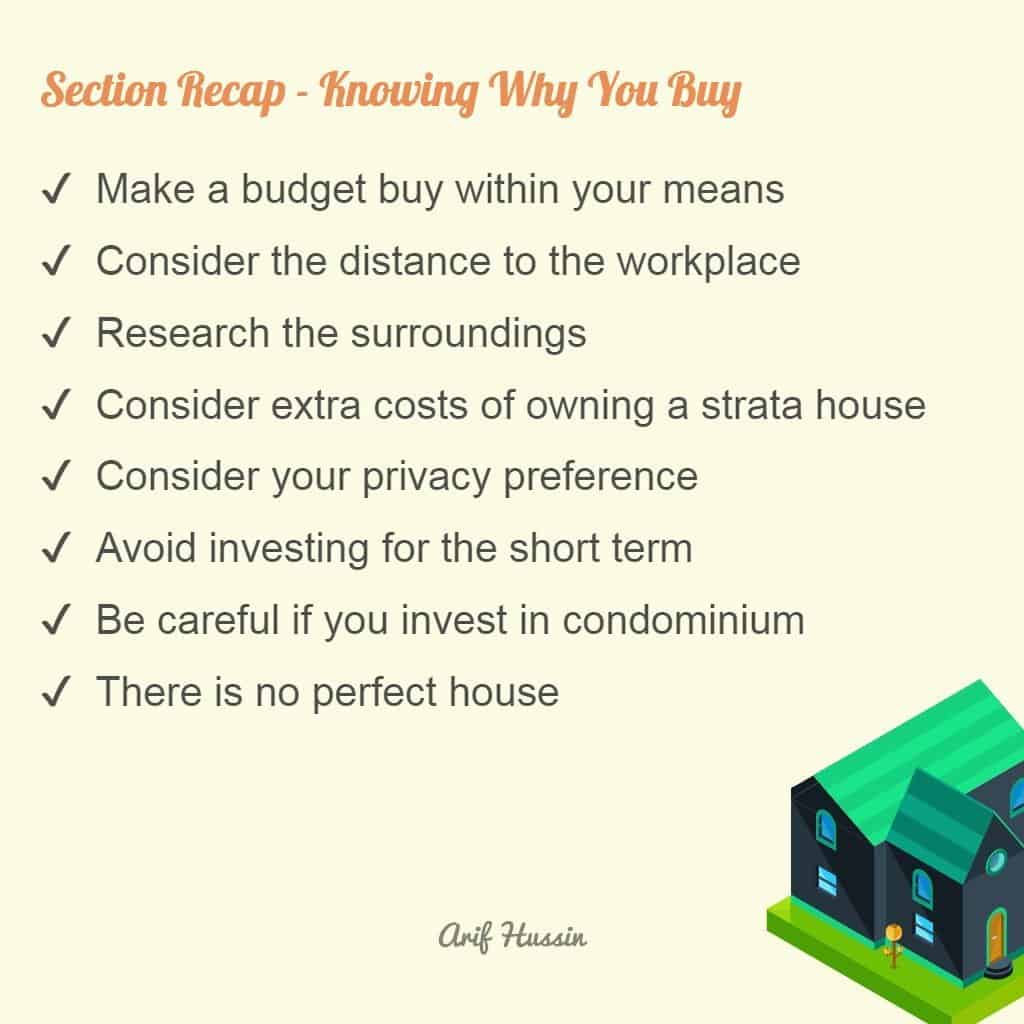
5. If you need privacy
Bungalow, semi-detached house and low-density condominium are great choices if you are looking for privacy.
But there is a trade-off. Privacy itself is a luxury feat and command higher property price.
6. Avoid investing for short term
For investors-alike…
At the time of writing, there is an oversupply of property in the market.
Developers are finding a hard time to clear their units.
Some shift their portfolios to focus more on affordable housing instead of high end unit.
Meanwhile, in sub-sale market I have seen houses in certain areas dropped to a rock-bottom figure.
It takes gut, patience and twice the research if you want to invest at the moment.
If you buy, you will not reap the benefit within one or two years. It will not improve soon.
But for the long-term investors and bargain hunters, there is a potential gold mine awaiting.
7. Be careful if you want to invest in condominium
I have said above there is an oversupply.
Specifically, condominium takes the lion share of the hit.
Be extra meticulous.
You should research the surrounding condominium and how much landed property is selling in the area.
Because there can be a mismatch.
Prices for landed property may have dropped and the prospect of buying a condominium may not be as attractive.
Besides that, some developers launched condominiums with a price tag comparable to the price of landed property within the same area.
Pity the uninformed buyers when they can’t rent or sell their house later.
8. There is no perfect house
Last, I want to stress that finding a perfect house is almost impossible.
Be open mind and don’t set the expectation too high.
It’s okay to compromise certain features after you give careful thought. But always make the best choice.
Chapter 3
Types of Property Title
Now you have short-listed your property, it is also crucial to understand the differences between property titles. These affect many things such as ownership, eligibility and period of transfer and financing.
1) Check the land usage
Here you want to identify whether the developer built the property on residential or commercial land.
Property such as service apartments, SOHO and SOVO for example, are built on commercial land.
These type of houses comes with higher taxes and utility rate.
For first home buyer, there is no discount on stamp duty (MOT).
It’s not wrong to buy these properties if you know what you are doing.
Certain people will find it an advantage because they come together with commercial units.
There can be shops, restaurants and groceries in the same building. What a treat.
2) Ascertain whether the property is freehold or leasehold
The land tenure determines your control and also affects the period of transfer.
Freehold is a permanent ownership.
The land is yours forever unless the Government gain it back through a certain act.
In Klang Valley, except for Malay Reserved land, freehold land rarely requires consent to transfer from the state authorities.
This mean that transferring ownership from a seller to a purchaser is easier and shorter.
The lawyer can complete the whole transfer process within 90 working days from the sale and purchase agreement.
In contrast…
The ownership of a leasehold land is only up to a certain period, usually 99 years.
The land is not yours but owned by the state government instead.
When the lease is near to expiry, you can extend the lease period by paying a certain land premium.
The state government will repossess the land if you choose not to renew.
Because the state government is the ultimate owner, any transfer require their consent.
Hence, the process to transfer ownership for leasehold property is longer than permanent ownership.
The lawyer can conclude the transfer process within 6-7 months from the sale and purchase agreement.
One major caveat..
Transferring leasehold property from a Bumiputera seller to a non Bumiputera buyer is difficult.
This is because the state government may have a policy to ensure Bumiputera holdings in real estate.
They will not approve the application unless for very strong reasons.
Besides that, if you are interested to buy a leasehold property, don’t forget to check the balance lease period.
Bank do not favor leasehold property with a short tenure of 40 years and below.
The chance of you getting your application approved is slim to none for this property.
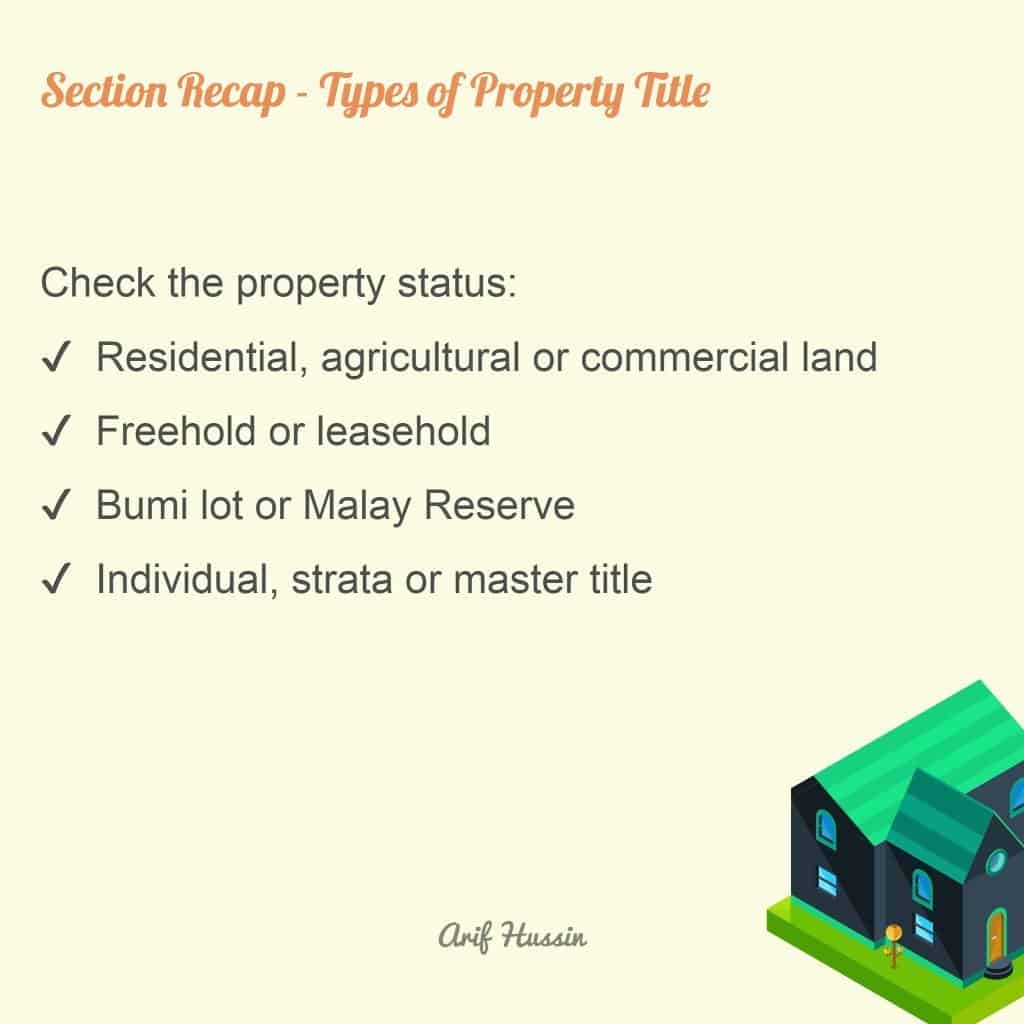
3) Find out whether the property is Bumiputera lot or Malay Reserve
When a developer apply to construct a housing project, the authority imposed a certain quota units.
The Developer can only sell these units to Bumiputera at a discount.
This is what we called Bumiputera lot.
Regardless whether the property is freehold or leasehold, a Bumiputera seller cannot transfer a Bumiputera unit to a non-Bumiputera purchaser.
However, a Bumiputera owner who owns freehold property (without restriction) with Bumiputera status, can still sell to non-Bumiputera if the land status is converted to an individual or strata ownership.
Compared to Bumiputera lot, Malay Reserved status is even stricter.
Only Malays can exchange this property.
Both leasehold and freehold property, can also have Malay Reserved status at the same time.
4) Confirm whether the property is master title, individual title or strata title
Master title refers to the land where the developer has yet to subdivide and transfer to the purchasers name.
If you perform a title search, you see that the developer still owns the land.
Buying master title house aged over 10 years through bank financing is difficult nowadays.
Majority banks reluctant to finance except for Bank Simpanan Nasional.
It is also a red flag and signifies that the developer is problematic.
Don’t worry too much if you buy a new house. There is a regulation in place to safeguard you.
But take precaution if you buy property from secondary market.
Especially apartment and condominium.
There are also cases where the title is ready, but the owner yet to start the transfer.
Luckily, banks able to finance this kind of property though the duration to complete the purchase will take longer than usual.
When a developer subdivided and transferred the title to the purchaser it becomes individual title for most landed property..
… and we called it strata title for high-rise, townhouse and triple storey house and above.
5) Freehold vs. leasehold
Should you insist on buying only freehold property?
There are many opinions. Mine would be like this:
If there are two adjacent houses, one freehold and the other is leasehold with all other things being equal, choose freehold.
If you buy a home for your own stay, your family priorities come first. After you have covered all your priorities, then choose freehold.
When buying for investment what is more important is the demand for the house. There is little value in buying a freehold property that nobody wants to rent or buy.
Chapter 4
The Costs of Buying a Property in Malaysia
You need to prepare cash amounting to 13% – 15% of the purchase price for the costs below.
1) Deposit
Deposit is 10% of the purchase price.
When you agree to make a purchase, you need to pay 3.18% booking fee to a real estate agency or lawyer as the trustee.
You will then apply for a housing loan. The application will take around 10 working days.
If a bank approves your application, you will then sign the sales and purchase agreement and pay balance deposit of 6.82%.
2) Legal fee and stamp duty
Prepare cash around 3% – 5% of purchase price to cover for the legal fees and stamp duty.
Legal fees include professional fee and disbursement payable to the lawyer while stamp duty fees to Lembaga Hasil Dalam Negeri.
When do you need to pay for these costs?
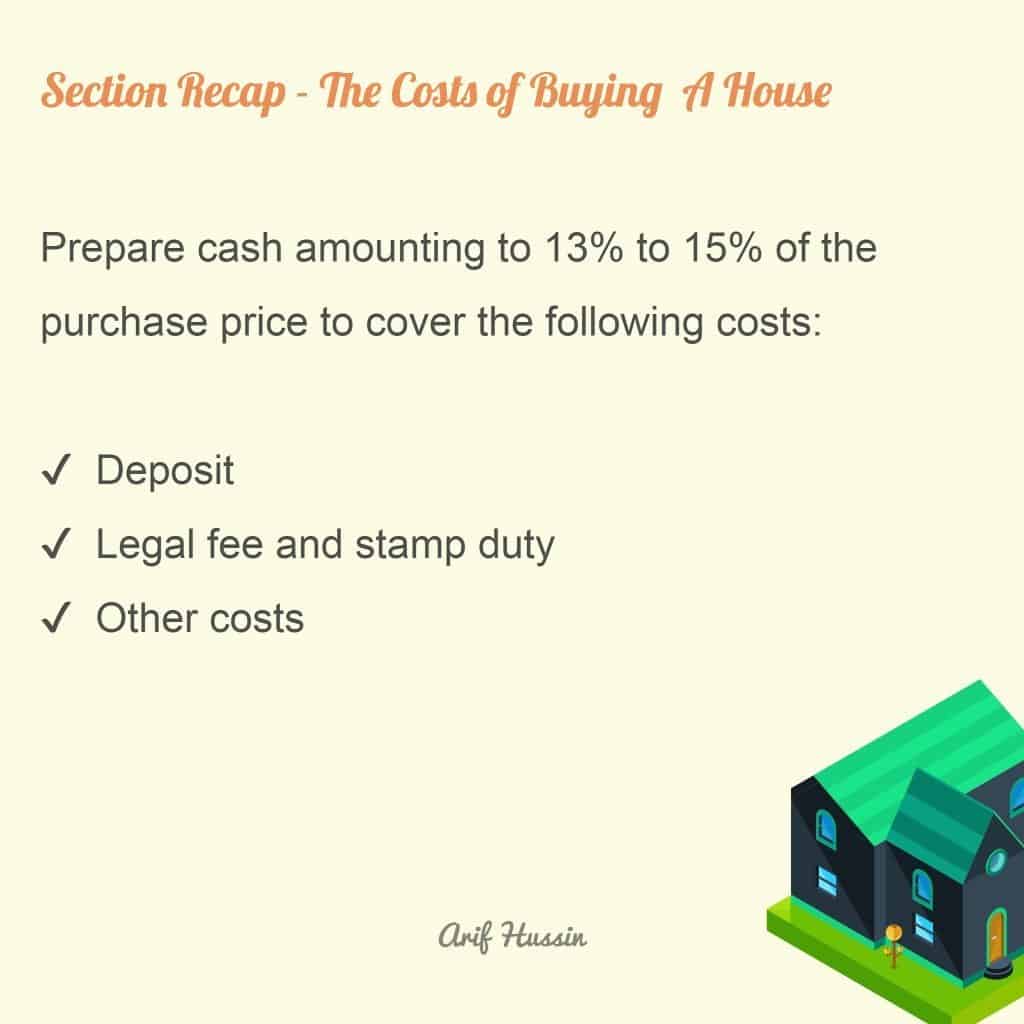
When you engage a lawyer service, they will ask you to pay a deposit as collateral. In my experience around RM300 – RM500.
After you signed the sales and purchase agreement / loan agreement, they will bill you the full amount.
For loan agreement, most loan packages can absorb the legal fees in the loan. But please double confirm with your banker.
There are also loan packages that do not cover for the legal fee. For example, My First Home Scheme and Youth Housing Scheme.
3) Other costs
For housing loan there is also the cost of insurance and valuation.
These costs are usually included in mortgages.
But as I mentioned before you should ask the banker about this on the chosen package.
Chapter 5
Preparation to Apply for a Housing Loan
If you want to apply for a housing loan, get your financial house in order. Here are a few tips.
1) Ensure your status as a permanent employee
If you are an employee, make sure your status is permanent because the bank assesses your income stability through job status.
Working as a temporary or contract staff reduced your chance to get your loan approved.
If you just started working, check your employment letter. Most employer will change your status to permanent after around 3-6 month.
Exception to that, banks still accepts a contractual civil servant but have worked for over 6 months.
2) Check the EPF statement and ensure the employer make contribution
Check your EPF statement before you buy a house
You want to make sure your employer pays the contribution consistently and on a timely basis.
If not, the bank assumes your employer is problematic and will degrade your financial scores.
I handled a case before where the purchaser‘ employer forgot to contribute.
It messed and delayed the loan application. Lucky enough for me, the seller was kind enough to wait until the problem solved.
3) Make sure the salary received in the bank statement is equal to the salary slip
Your net salary in the payslip must tally with the amount received in the bank statement.
It sounds common sense. But guess how many cases I handled with such problems? Many.
4) Pay income tax
Don’t evade the tax. It’s unlawful and troubles your loan application.
Bank will require EA form when you apply for housing loan. So it’s important that you pay your taxes.
Most employer deducts the tax from the employee salary on a monthly basis. But some don’t.
If you are the later, you must pay your annual tax or risks getting your loan rejected. LHDN will penalised you too.
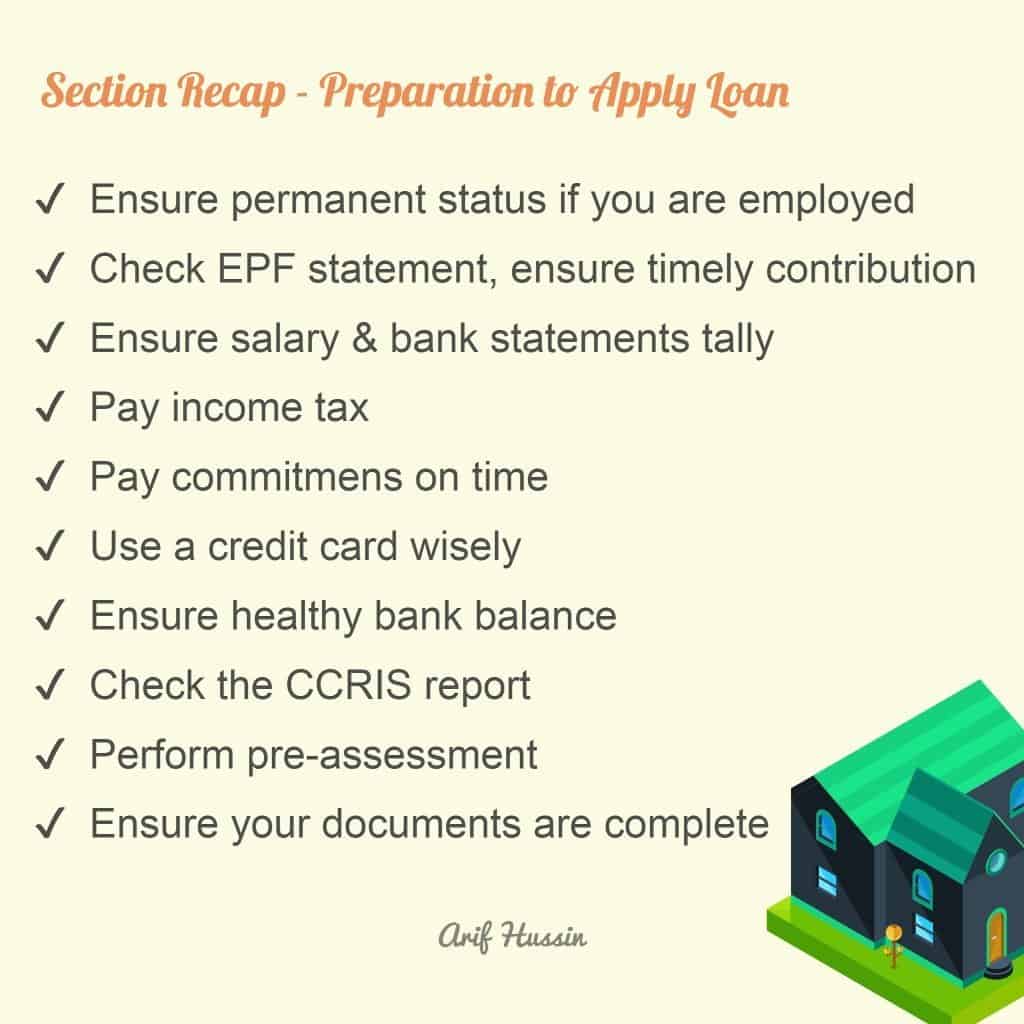
5) Pay all commitments on a timely basis
Make sure you pay existing monthly commitment to any financial institution on schedule.
This can be a personal loan, car loan, housing loan and others.
Bank knows your payment habit for existing commitment.
They can access to your payment record from the Bank Negara CCRIS system and use this report to grade your financial scores.
Say goodbye to your dream house if you pick up a late payment of two months in arrears for existing commitment.
Although bank can still approve if you have one month delay, they still consider you as risky and therefore your interest rate will be higher.
If you own a PTPTN loan, pay it on time. Settle any overdue amount or if you can’t afford, talk to PTPN officer to restructure or reschedule your payment.
Avoid selling cars without changing the ownership. If the new owner do not pay the installment, this will affect your CCRIS record, not theirs.
Do not being a guarantor. Same case as above, the risk is on you.
6) Use a credit card wisely
Avoid using more than half of your credit card’s maximum limit.
This is because the bank will assume you depend on a credit card and degrade your financial scores.
7) Ensure remaining bank balance is healthy
The bank also look at your remaining monthly bank balance. If possible, make sure the end balance keep increasing every month.
In addition, if you own a salary around RM5,000 per month, it’s good that if your bank balance do not go below than RM1,000.
8) Check the CCRIS report
You can print this CCRIS report at Bank Negara or online.
From this report you can ensure there is no delay in repaying any commitments.
Checking the CCRIS report also give you a full picture of your commitments.
Sometimes, you don’t realise you own this and that commitment until you review. This can be a loan with a credit company such AEON for example.
9) Perform pre-assessment with a banker
You can also ask for a banker help to screen your financial for loan eligibility.
A banker can advise you how much loan you can take out based on your income.
10) Make sure supporting documents are complete
To buy a home make sure the supporting documents are complete. If you are employed, here are the required documents:
- Photocopy of identity card
- Latest three month salary statement
- Latest three month bank statement
- EPF statement and / or EA form
- Support documents for side income (rental income, ASB etc.)
- Booking form or letter of intent to buy a house
Chapter 6
Applying for a Housing Loan
Do not apply for a housing loan until you consider these points.
1) Margin of financing
The margin of financing for the first and second housing loan is 90%.
For example, let’s say you bought your first house for RM100,000. Bank will finance RM90,000 and the balance RM10,000 you need to pay by cash as a deposit.
If you buy a third house using housing loan, the margin of financing will be 70%.
It is important to take note…
Bank determines your margin of financing based on the number of housing loan you owed. If you have two housing loans, the third home loan margin is 70%.
However, if let’s say you paid the first or the second housing loan, the margin revert to 90% again.
So remember this. The margin of financing is not reliant on the number of house you have, but the number of housing loan instead.
In addition, the bank provides an additional 5% of the purchase price to cover for the legal fee for loan agreement, stamp duty and valuation fee.
That’s why sometimes we see advertisement stating housing loan margin is 90+5%.
2) How joint loan affects margin of financing
If you apply loan together with a joint applicant, it will affect the third housing loan margin.
As I mentioned above, margin of financing for the first and second mortgage is 90%. The third one 70%.
We take a pair of husband and wife for example. They should be able to get 4 housing loan at 90% margin (two units wife, two units husband at 90%).
However…
If the pair bought their first house together as joint applicants, the bank considers BOTH have already used their first 90% quota.
Previously the pair might buy four units, but now they can only buy three units at 90% margin.
So if you are looking to invest, plan your purchase.

3) Housing loan package
Should you choose fixed or variable interest rate loan package?
I recommend taking variable rate.
The interest rate for a fixed rate package is a lot higher.
Chances that the variable rate increase higher than the fixed rate is also low based on the past 10 years trend.
You will enjoy lower monthly instalment for the duration of loan using variable rate.
Note: If you are a Muslim, don’t forget to choose a sharia-compliant package.
4) Housing loan interest rate
Use Loanstreet to check on the bank interest rate.
But take note…
You may not get the interest rate as advertised.
This is because, a bank offers an interest rate based on many factors such as
- Your credit scores
- Stability of your employer
- Which industry you are working
- The price and location of the property you are buying
If the bank considered the applicant as risky, the interest rate will be higher.
In 2019, expect to get interest rates around 4.4% to 5%.
Chapter 7
How to Buy a House Without Deposit
You can buy a home without deposit through these methods:
- Buy an under-construction house
- Use My First Home Scheme
- Use BSN Youth Housing Scheme
- Make EPF withdrawals
1) The myth of buying sub-sale property without deposit
Before I start, I want to correct a misconception.
Buying a sub-sale house without deposit does not mean without money.
This is because:
- You need cash to pay the booking fee. Usually 3.18% from the purchase price. This is the collateral and I don’t think owner will agree you want to buy without collateral payment at all.
- You also need to pay the balance deposit of 6.82% upon signing a sales and purchase agreement. There are owners willing to wait until disbursement for the balance deposit, but they are rare.
- You need to pay the lawyer for the legal fee and stamp duty.
After you complete the purchase, you will get back the deposit you have paid from EPF or 100% loan.
You will not get back the lawyer’s fee and stamp duty.
2) Buy under-construction house from a developer
Alternatively, if you are short of cash, you can buy under-construction property.
There are developers that give a good offer with minimal booking fee and no legal fee and MOT costs.
But you know what, they already factor all these in the selling price. And we thought they give free money like an ‘Arab Tycoon’. Hah!
3) Use My First Home Scheme
The government introduced My First Home Scheme in 2012 to help young people purchase their first home.
All major banks in Malaysia takes part and offer this scheme.
Under the scheme, eligible applicants can get loan margin up to 100% of the purchase price.
Based on my experience, the interest rates offered are higher than using the usual 90% package. Somewhere around 5% to 5.5%.
Another disadvantage is that the scheme does not absorb legal fee, stamp duty and valuation cost. These costs you have to fork out your own money.
Before you apply this scheme, check your eligibility first at My First Home Scheme website.
4) BSN Youth Housing Scheme
Bank Simpanan Nasional pioneered the Youth Housing Scheme.
There are several other banks offering similar schemes such as Bank Rakyat and Bank Muamalat (if I not mistaken).
Similar to My First Home Scheme, this scheme offers loan margin up to 100% of the purchase price.
The interest rate is also high. Around 5% to 5.5% and the scheme does not absorb legal fee, stamp duty and valuation cost.
So what’s so special?
For the first 2 years, The Youth Housing Scheme subsidised your monthly instalment of RM200.
For example, let’s say the monthly payment is RM700. You only pay RM500 for the first 2 years.
After the second year, the monthly payment reverts to the original RM700.
Consult BSN branch or website for more information on eligibility.
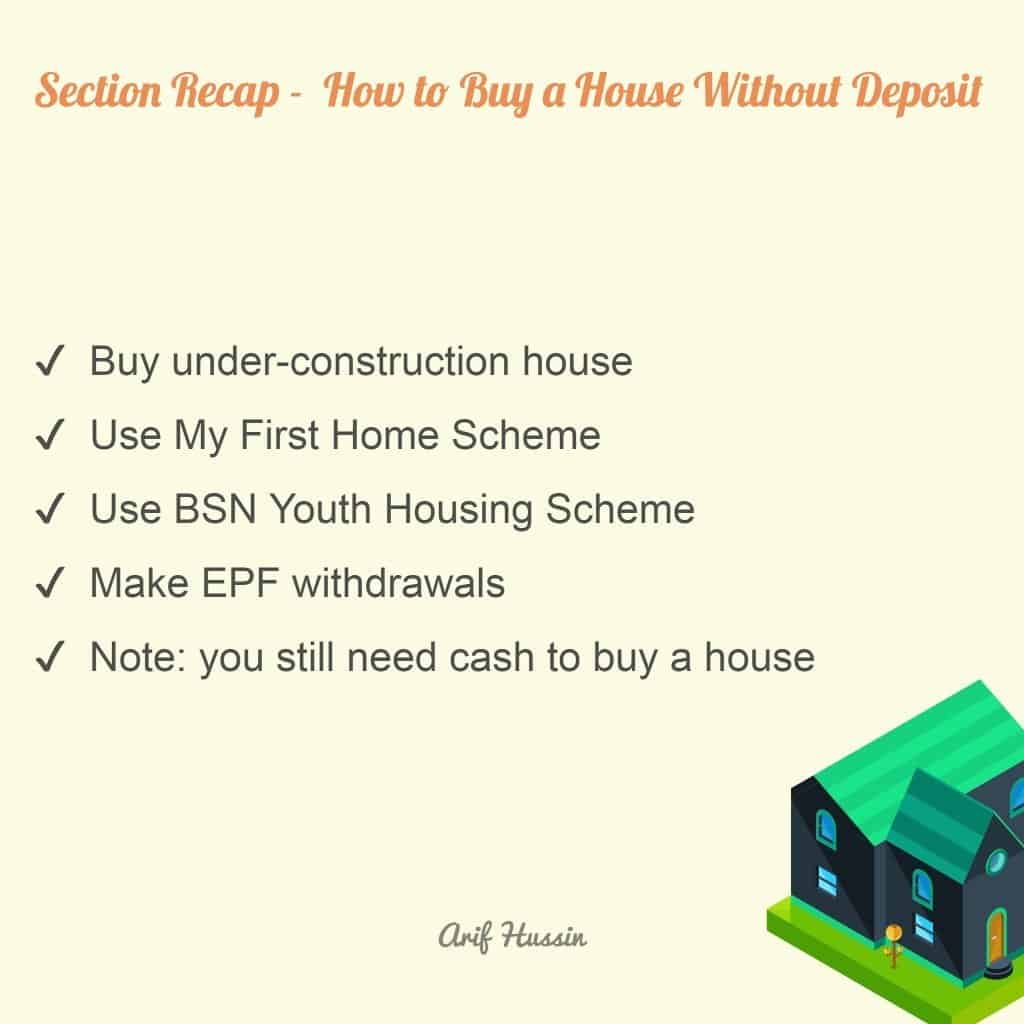
5) Mark-up
Mark-up is a technique where you manipulate the purchase price intending to get a cash back.
Buyers use this method to cover for deposit, legal fee and stamp duty costs.
Some even exploit to get extra money.
In mark-up arrangement:
- You agreed a purchase price with the owner
- Then you present to the bank a higher price than the original when applying for loan (mark-up price)
At the end of the purchase, you will get the difference between the original price and the mark-up price (times the margin of financing).
This method is illegal.
You present wrong information to the bank to get extra cash.
Many banks such as Maybank have come out with measures to combat this practice.
Mark-up also have many disadvantages:
- Higher monthly instalment
- Lower your ability to get subsequent loans
- Higher legal fee and stamp duty costs
- If the seller subject to Real Property Gains Tax, it is likely that they will charge you on the portion you marked-up.
You should not use this method. If you are discipline with your finance and build your savings, you’ll be able to buy a home too.
As an alternative, use My First Home Scheme or Youth Housing Scheme
6) Make EPF Withdrawal
Last, you can make EPF withdrawal to finance the deposit and transaction costs.
EPF allows you to withdraw an amount equals to:
- The difference between the purchase price and the loan amount;
- plus additional 10%;
- subject to availability of cash in Account 2.
For example, let’s say the purchase price is RM100,000, and the loan is RM90,000.
You can withdraw RM10,000 (RM100,000 – RM90,000) plus an additional 10% of the house price of RM10,000.
Total withdrawal for this example is RM20,000.
However, you need to take note. If you use 100% loan package such as My First Home Scheme, the amount you can get is only 10% of the purchase price.
Chapter 8
Home Buying Procedures
The 8 steps to your dream house.
1) Do your research
You should do your homework before you pick a house to buy.
Don’t rely on agents to do this for you because you are the ultimate owner of the house later.
Before you view a house, make sure you know details on:
- Location of the house and the neighborhood
- Local amenities such as a police station, school and hospital
- Market value of the house and the asking price for the same house in the neighborhood
- Road access
- Rental yield and other estimates if you buy for investment.
2) Set a time to view the house
Contact the real estate agent and arrange a time.
It is good if you set an appointment during daytime. You will have a better picture of the surrounding.
Who knows the unit you view is fronting a graveyard which you may not see at night. Hah!
Also, try to visit the property again during peak hours. You want to gauge how congested the place.
A good property agent will ask about your preparation to buy and also check your loan eligibility.
Give full co-operation. They will be very helpful if they understand you.
3) Viewing
When you view the house, pay attention to the followings:
- The surroundings
Is there anything that makes you not happy to stay there? Sewage plant or power station for example. - Property micro location
Which floor it is or which direction the house is facing? - The neighborhood
Who will be you be your neighbors? Are they families, students or even foreign workers? - Property maintenance
How well the house or building being maintained? What about cleanliness? And how much is the maintenance fee per month? - Property condition
Note any damage to the unit. There are four types of damage that can be costly. Cracks, leakage, clogging and wiring.
Note: paint crack is okay and easy to fix. But structural crack is more serious. If in doubt, you can ask a contractor to have a look.
Besides that, list down the furniture that the owner sell together with the house and include the list in the sales and purchase agreement to avoid future problems.
4) Sign the booking form
After you agreed on the price, it’s time to sign the booking form.
I advised you to pay attention to the terms because they are very important.
Any breach may cause problems and worst the owner can claim your booking fee.
The booking form sets out:
- How long is the allowable period for you to get your loan approved and sign the sales and purchase agreement? This is around 14 to 21 working days.
- When do you need to settle the 10% deposit and the balance purchase price?
- What would happen if the bank rejects your loan application? I advised you to negotiate with the owner to return the booking fee if this happened.
- What are your rights if the seller cancelled the sale or the consequences if you do not complete the purchase?
To book the house, sign the booking form then pay 3.18% of the purchase price to the real estate agency as the trustee.
Make sure you pay to a registered property agency. You can check their registration at the BOAVEA website.
If you purchase from the seller, avoid paying the booking fee directly. Appoint a lawyer and pay to them instead.
This is because:
- You don’t know the seller. Who knows you might deal with scammers.
- The lawyer has not performed the title search. The house might not belong to him.
- The bank has not approved your loan and the seller might have spent your money.
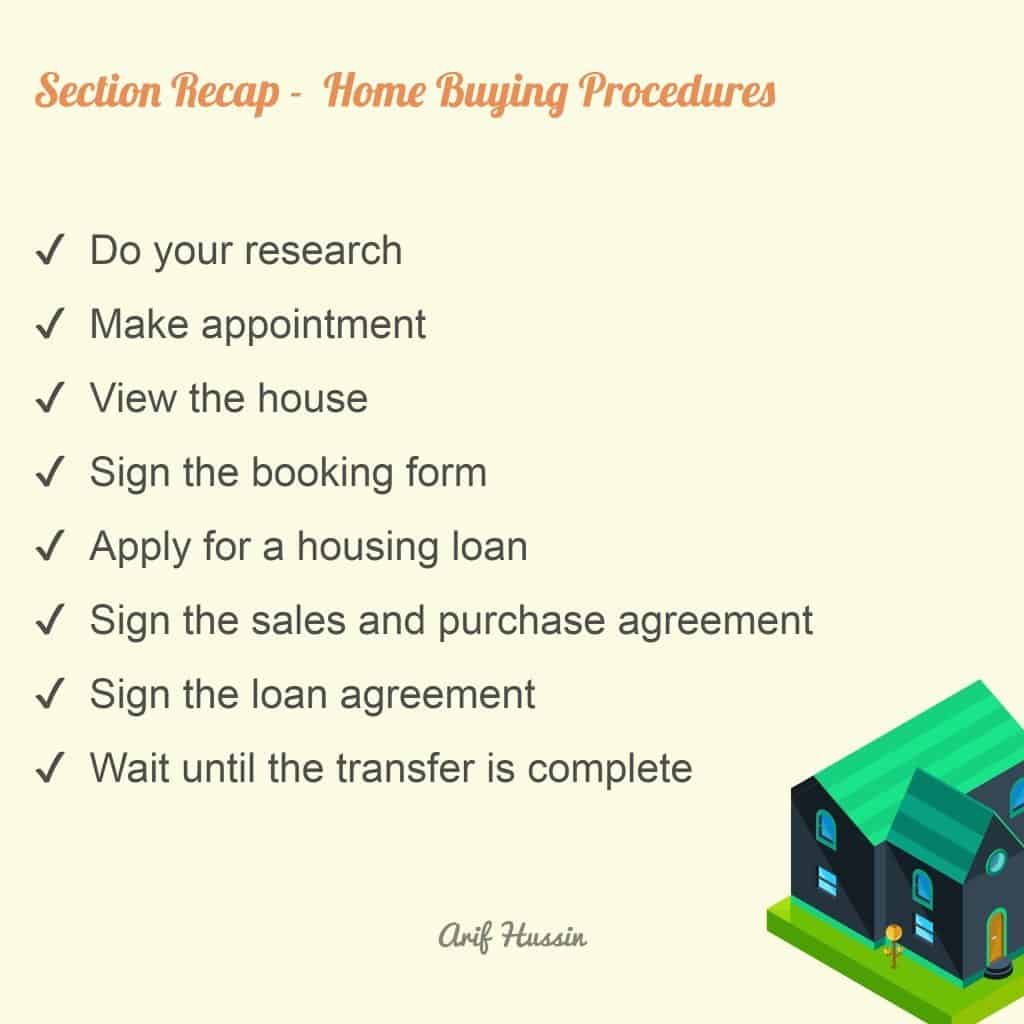
5) Apply a housing loan and engage a lawyer
When seller agreed with your offer, you then apply for a housing loan.
You also need to engage a lawyer service to draft the agreements, latest after the bank approved your loan.
A real estate agent can assist you on this.
6) Sign the sales and purchase agreement
Make sure you sign the sales and purchase agreement within the period as stated in the booking form.
This can be within 14 to 21 working days from the booking form date.
Ask the lawyer to brief you on the terms in the sales and purchase agreement before you sign.
You can also ask them the estimated duration to complete the purchase.
This is crucial because you want to know when do you need to shift to your brand-new house.
After that, pay the balance deposit of 6.82% together with the lawyer fee.
7) Wait until the lawyer transfer the ownership to you
The lawyer will assist you to complete the loan agreement and transfer the ownership to you.
How long is the process?
It depends on the property title and complexities of the case.
For freehold property with an individual or strata title, a lawyer able to complete the transfer within 90 working days from the sales and purchase agreement date.
The process might be longer for:
- Leasehold property or
- Property with a master title
This is because the transfer for these properties requires a consent or confirmation from the state authority or the developer.
The process to get the consent / confirmation can take around one to three months, depending on how swift the response is.
Only after getting the approval the lawyer can start the transfer. This will take additional 90 working days.
Generally it would take around 6-7 months to complete the purchase of a leasehold or master title property in total.
8) What happened if you are not able to complete the purchase within the stipulated time?
The owner will grant you an additional one month. But here’s the catch.
In this period the seller will charge you a penalty at 8% per annum, calculated on a daily basis.
Towards the end of the process…
Your bank will make payment to the owner twice. First to settle the outstanding balance owing to his bank. The second payment if for his or her profit.
You need to know this to avoid confusion.
Your instalment starts when the bank made the first payment. At this point, the owner has no obligation to deliver to house to you yet.
The house is yours only after your bank made the second payment, around one to two months after the first payment.
Last, transfer the utility, maintenance and assessment to your name after you received the key.
All done, congrats!
Chapter 9
Tips on Selecting a Bank to Apply for a Housing Loan
Not the bank you deserve, but the bank you need.
1) If your financial is strong
I suggest you use CIMB or Maybank.
These two banks offer a great service and they can approve your housing loan within 5 working days if all documents are complete.
RHB is also a good choice. To my knowledge, they have a higher debt service ratio tolerant as compared to Maybank and CIMB.
2) If you buy property with a master title aged over 10 years
Bank Simpanan Nasional is the only bank that will accept your application.
3) 100% loan
Most banks takes part in My First Home Scheme. But based on my experience, Bank Islam offers lower interest rate compared to other banks.
If you want to use Youth Housing Scheme package, go for Bank Simpanan Nasional.
4) Some extra tips
The bank will approve your loan within 2 weeks. When approved, informed the lawyer to draft the sales and purchase agreement.
You also need to sign the loan offer letter from the bank and it is extremely important to read the terms and condition.
Among others, you need to ensure you get what you applied.
For example, if you apply the loan for a 90% margin or to absorb the legal fee, the loan offer letter should state that.
There was a client of mine where the bank approved his loan lower than what he applied for. He signed the offer letter without knowing.
That caused a lot of problems later when I realized the loan amount is not sufficient.
Lucky him, he had yet to sign the sales and purchase & loan agreement.
I helped him re-applied at another bank. Though it was a success, the problem caused an unnecessary delay.
Chapter 10
Tips on Choosing a Real Estate Lawyer
When buying a property, you relationship with a lawyer is for a long period of time. Choosing the right lawyer is very important.
1) You need a lawyer with experience
A lawyer can specialise in many things. You want to choose one who deals in real estate. This ensure the process is efficient and with a minimal problem.
Ask a friend or real estate agent to refer a lawyer if you are not sure. Especially if you use government loans.
2) Choose a reputable lawyer
An establish lawyer gives you security. You’re confident he will safeguard your interest and money.
You also want a lawyer that focus on his job rather than other businesses he might have.
I tell you there is a lot of part-time and freelance lawyer in the market.
Avoid such kind of lawyer. They usually can’t focus to complete your case.
3) Choose a lawyer nearby to your property
If possible, choose a lawyer nearby to the house you are purchasing. Especially if you buy a master title property.
They are more familiar with the local authorities, developers and also potential issues.
4) Get a quotation
Get a quotation from the lawyer so you can prepare and avoid surprises.
The legal fee charges are almost similar between lawyers. This is because the government controls their fees.
In my opinion, it is more important to choose a trusted lawyer rather than the cheapest. Trust me, it’s worth the money.
Take note, the lawyer will ask you to pay a deposit when you engaged them. They will bill the balance legal fee when the sales and purchase agreement is complete.
Chapter 11
Home Buying Issues
These are common issues when buying a property and how to prepare for them.
1) Purchasing a master title property aged over 10 years
Most banks do not finance such property anymore. At the time of this writing, only Bank Simpanan Nasional can accept your application.
But what matters most is for you to consider whether to buy this kind of property at all.
2) Purchasing a master title property pending perfection of title
If you buy a master title property pending transfer of title to the seller’s name, the purchase process will take time.
This is because the developer needs to transfer the title to the owner’s name, then only the seller can transfer to yours.
Some developers can transfer directly to the purchaser. This usually involves freehold property. But it is rare.
The transfer can range from an additional of five to twelve months on top of the normal purchase period.
Hence, it is crucial for you to consider whether the period fits your plan.
3) Bankrupt developers
You can still purchase a master title house with bankrupt developers, so long there is a liquidator.
But you also should expect, you won’t get the key so fast.
4) Divorce
If you buy a house from a divorced seller, ask them whether they went through the court process to determine their entitlement to the house.
If they don’t, it is risky to buy. Ensure both of the husband and wife:
- Agreed to sell
- Accepted the offer price
- Committed to sign the sales and purchase agreement
- Respect the other party entitlement to the house
Please also make sure you pay the booking fee to a lawyer.
I have handled many cases such cases. They involved emotional and either one of the husband or wife may not commit to complete the sale.
Conclusion
That’s all for now. I will update this guide from time to time. It is my hope this guide helped you to secure your dream house. Thank you.


The blog post on Arif Hussin’s website provides a wealth of valuable information for individuals interested in buying a house or property in Malaysia. The author’s in-depth analysis of the property market, coupled with practical tips and guidance, makes it a comprehensive guide for both first-time buyers and seasoned investors.
One aspect that stands out is the author’s emphasis on conducting thorough research. From understanding the current property market trends to exploring different locations and property types, the importance of gathering information before making a purchase is highlighted throughout the post. This advice helps potential buyers make informed decisions and increases their chances of finding the right property., Arif Hussin’s blog post on buying a house or property in Malaysia is a valuable resource for anyone embarking on this journey. The comprehensive information, practical tips, and emphasis on thorough research empower readers to make informed decisions and navigate the property market with confidence.
Thank you to Arif Hussin for sharing this insightful and informative blog post. It serves as a valuable guide for individuals seeking to buy a house or property in Malaysia and ensures they are equipped with the necessary knowledge to make a wise investment.
I’m buying an apartment at Princess Cove.
Do I still need a lawyers like to you to go through the terms and conditions with me.
I’m not getting a definite date of completion/ handover. I’m concern! Any advise?
Can you help me sell my apartment please? I purchased it beginning of 2019 whilst its still under construction, it will be completed Q1 2022. My personal circumstances have changed now since I signed the papers and would no longer want to keep the apartment, even though it is not even ready yet. Would really appreciate your help.
Hi Ms Sarah. It would be advisable to wait until the house is completed. The purchaser cannot obtain financing if the house is still under construction.
Resourceful article. Thanks!
You are welcome